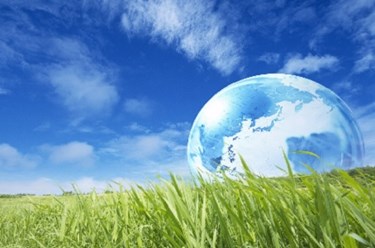Big Food Companies With Big Sustainability Goals

By Sam Lewis

A new report shows some of the world’s-largest food makers are taking steps to help make sure farmers can produce crops in environmentally-friendly ways. But for real improvement to happen, more need to follow suit
Ceres — a Boston-based network of non-profit companies, investors, and public-interest groups — released a report focusing on climate change and its effects on corn production. Companies such as General Mills, Unilever, and Coca-Cola are already going through sustainability initiatives, but that may not be enough. The report says measureable goals and completing these goals in a timely manner are necessary to make real improvements.
Perhaps most importantly the report addresses water usage, water damage, on-going drought, and soil damage. “Climate change and pressures on water supplies pose financial risk to our agricultural industry, but it’s not just the Corn Belt’s problem,” says the reports co-author, Brooke Barton. “Companies that depend on U.S. corn have a big role to play in sending market signals that these issues matter.” Additionally, the report takes on other extreme-weather events, the steadily-increasing depletion of ground water, irrigation, and fertilizer usage.
In the report, companies are called upon to establish goals that reduce production’s impact on the environment and create procurement contracts. These contracts would require crops to be sustainably grown and growers would be responsible for identifying farms and areas of high-water usage, groundwater pollution, overusing fertilizer. Coca-Cola, General Mills, and Unilever have all worked with Ceres to adopt sustainability practices that give specific goals to farmers and suppliers. If farmers and suppliers wish to continue selling products to these companies, these specific guidelines must be met.
Last year, Coca-Cola announced it would be purchasing all of its agricultural ingredients from sustainable sources by no later than 2020. This includes corn used to make high-fructose corn syrup. “We know how to make beverages. We don’t necessarily know how to grow corn, but we do have a good opportunity to influence our suppliers,” says John Radtke, Coca-Cola’s water resources sustainability manager. “We have shared our sustainable agriculture-guidelines principles with suppliers and asked them to meet those and they’ve developed a plan to implement those over the coming years so we can meet that 100 percent by 2020.” Additionally, the Ceres report suggests companies begin substituting different grains for corn.
General Mills began its sustainability program in 2005. Since then, the company has been focusing efforts, both physically and financially, on improving water and fertilizer usage. In southeastern Minnesota’s Root River regions, General Mills gave $300,000 to assist vegetable farmers implement new conservation methods to reduce soil erosion. In Irapuato, Mexico, the company gave interest-free loans to farmers, allowing them to invest in drip-irrigations equipment and improve vegetable production for the Green Giant brand. “Corporations are taking on the additional expense to ensure future supplies but also because of customer demand,” says Jerry Lynch, chief sustainability officer for General Mills. “More and more consumers are looking at what companies are doing in this area because that really demonstrates the care that a company takes with the ingredients which are the thing that a consumer cares most about in a food product.”
And don’t forget about the maker of Hellman’s mayonnaise, Unilever. The company is currently working with soybean farmers in Iowa to create a calculating device that will measure energy and fertilizer use, water quality, and greenhouse gas emissions. Unilever’s has a heavy interest in improving soybean crops as the plant’s oil is a major component of mayonnaise.
